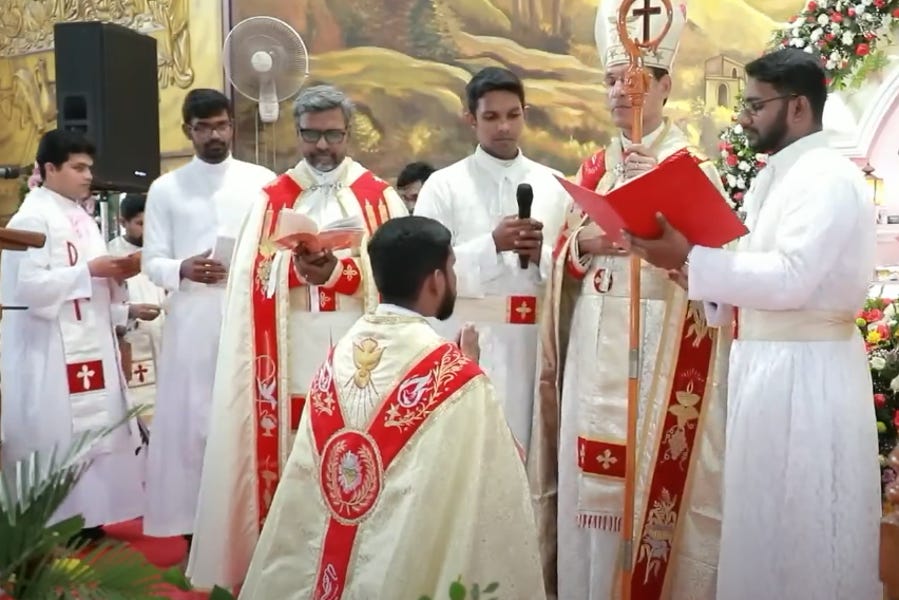Around 10 transitional deacons are ordained priests each year in the Archeparchy of Ernakulam-Angamaly, the Indian diocese on the front line of the Syro-Malabar Catholic Church’s liturgical dispute.

But the priestly ordinations of eight deacons did not go ahead as planned in December 2023, leaving men who had trained for at least 10 years in limbo.
Although the parties to the liturgy dispute reached an uneasy truce in July this year, the eight men continue to await their ordinations.
What’s causing the now nine-month hold-up? And are there any prospects for a resolution?
What’s behind the hold-up?
In a letter last November, the then apostolic administrator Archbishop Andrews Thazhath announced that candidates for the priesthood in the Ernakulam-Angamaly archeparchy had to promise in writing to celebrate only the new “uniform mode” of the Syro-Malabar Church’s Eucharistic liturgy (the Holy Qurbana) after ordination.
That was controversial because the vast majority of the archeparchy’s more than 400 priests are opposed to the new liturgy and have fiercely resisted attempts to introduce it. The dispute has been marked by hunger strikes, scuffles in the cathedral sanctuary, and the burning of pastoral letters and even cardinals in effigy.
The priests want to continue celebrating a form of the liturgy in which they face the congregation throughout the Eucharistic celebration, introduced after Vatican Council II.
The Synod of Bishops — the Syro-Malabar Church’s supreme authority — appealed in August 2021 for the universal adoption of the uniform mode, in which the priest faces the people during the Liturgy of the Word, turns toward the altar for the Liturgy of the Eucharist, and then faces the people again after Communion.
Thirty-four out of the Church’s 35 dioceses worldwide complied (with sporadic opposition), with the Ernakulam-Angamaly archeparchy alone offering mass resistance.
Thazhath’s letter included an oath to be sworn by the deacons.
It said: “I will celebrate Holy Qurbana only as per the Synodal decision on the uniform mode of celebration and I will not celebrate illicitly against the Synodal decision.”
None of the deacons appeared to take the oath. Weeks later, Pope Francis accepted the archbishop’s resignation as apostolic administrator amid an overhaul of Syro-Malabar Church leadership.
Versus populum ‘martyrs’
In June this year, the Syro-Malabar Church’s new leaders declared that priests refusing to adopt the new liturgy by July 3 would be considered in schism and barred from ministry.
But on the eve of the deadline, both sides reached a fragile compromise in which parishes could continue celebrating the liturgy versus populum (facing the people) if they provided at least one uniform Eucharistic liturgy on Sundays and major feast days.
According to local media, clergy of the Ernakulam-Angamaly archeparchy threatened to withdraw from the agreement if, among other conditions, the deacons were not ordained by September.
Earlier this month, Catholics linked to the archeparchy shared on messaging apps what appeared to be an undated letter from the archeparchy’s new apostolic administrator, Bishop Bosco Puthur, to Cardinal Claudio Gugerotti, the prefect of the Vatican’s Dicastery for the Eastern Churches, and papal delegate Archbishop Cyril Vasil’.
The letter, whose authenticity The Pillar has been unable to confirm, expressed concern that the deacons were being portrayed as “martyrs of Qurbana versus populum.”
“The delay to ordaining them is becoming a matter of hyper-sensation day by day,” the letter said, adding: “The delay in their ordinations, as I am warned of, will affect detrimentally the phase of implementation of the uniform mode itself.”
Bishop Puthur is said to have read out part of the letter at a meeting with priests and agreed to write again to the Vatican concerning the deacons’ ordinations.
‘Sad and tragic’
Meanwhile, frustration is rising in the archeparchy over the lack of priestly ordinations.
Supporters of the versus populum liturgy say it’s unacceptable to require deacons to promise to celebrate only the uniform mode, when the archeparchy’s priests are offering the new liturgy solely on Sundays and other holy days of obligation. But they believe the Syro-Malabar bishops are divided over whether to soften the requirement.
They ask what would happen if a newly ordained priest was assigned to one of the minority of parishes where the congregation opposes any celebration of the uniform mode. They suggest the priests would be forced to celebrate the Eucharistic liturgy privately, leaving them in a humiliating position.
They report that the deacons’ parents are upset by the postponement of their sons’ ordinations and some of the candidates are considering alternative careers.
A priest of the archeparchy told The Pillar: “It is really a very sad and tragic situation in the archdiocese, where some bishops are playing with the lives of eight deacons who have spent all these 12 years in view of receiving ordination.”
What’s next
Since securing the July truce, Syro-Malabar leaders have seemed in no hurry to tackle the issues underlying the liturgy dispute.
The lack of urgency is perhaps understandable given the disagreement has raged for decades. Supporters of the liturgy versus populum might also be inclined to maintain the status quo.
But the deacons’ plight means that negotiations cannot be put off indefinitely. If more months pass without a resolution, priestly ordinations could become the spark that sets the archeparchy alight again.




